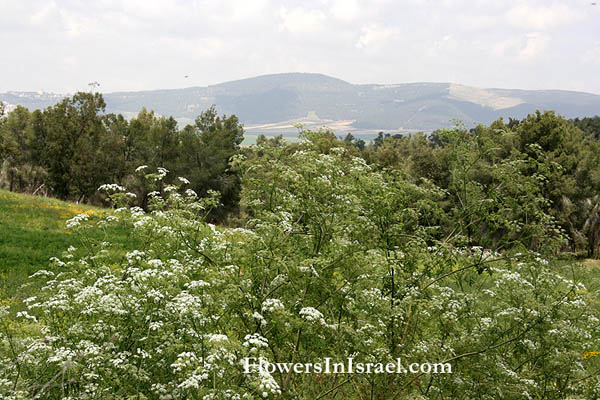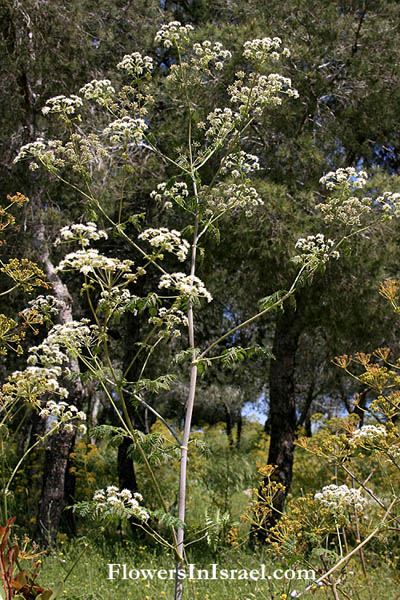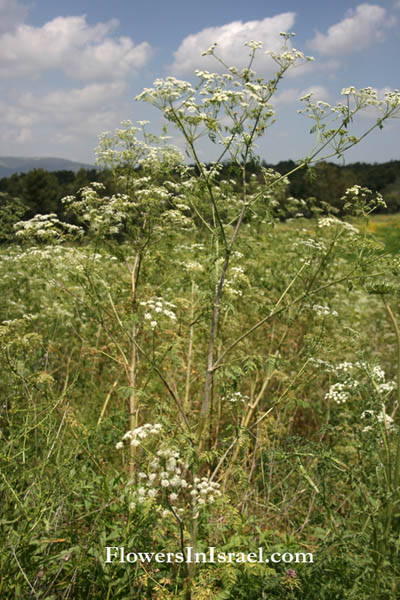Hebrew: רוש עקוד, Arabic: شوكران،, شقرون
| Scientific name: | Conium maculatum L. | |
| Common name: | Poison hemlock, Herb bennet, Mother Die | |
| Dutch name: | Gevlekte Scheerling | |
| Hebrew name: | רוש עקוד | |
| Arabic name: | شوكران،, شقرون | |
| Plant Family: | Umbelliferae / Apiaceae, סוככים |

|
| Life form: | Hemicryptophyte | |
| Stems: | 150-250 cm tall; smooth green stem, usually spotted or streaked with red or purple on the lower half of the stem | |
| Leaves: | Alternate, rosette, dissected, bipinnate, dentate or serrate | |
| Flowers: | White | |
| Fruits / pods: | Fruit 2–4 × 1.5–2.5 mm | |
| Flowering Period: | April, May, June | |
| Habitat: | Nutrient-rich soils, ruderal | |
| Distribution: | Mediterranean Woodlands and Shrublands, Semi-steppe shrublands | |
| Chorotype: | Euro-Siberian - Med - Irano-Turanian | |
| Summer shedding: | Ephemeral |

Derivation of the botanical name: Conium, from ancient Greek name coneion, (koneion) for hemlock. maculatum, Latin maculo, to spot, stain, pollute, defile; "spotted" or "mottled."
Conium "hemlock" contains the alkaloid coniine, a neurotoxin, and was probably the state poison of Ancient Greece, and the poison used in the execution of Socrates. After being condemned to death for impiety in 399 BC, Socrates was given a potent solution of the hemlock plant. Plato described Socrates' death in the Phaedo: 117e-118a, trans. Loeb Classical Library, Harvard University Press, Cambridge, Mass., 1990 edition, pp. 401-3. After Socrates drank the poison, 'he walked about and, when he said his legs were heavy, lay down on his back, for such was the advice of the attendant.' The jailor then began to examine Socrates, much in the way a modern physician might do. The man … laid his hands on him and after a while examined his feet and legs, then pinched his foot hard and asked if he felt it. He said ‘No’; then after that, his thighs; and passing upwards in this way he showed us that he was growing cold and rigid. And then again he touched him and said that when it reached his heart, he would be gone. The chill had now reached the region about the groin, and uncovering his face, which had been covered, he said – and these were his last words – 'Crito, we owe a cock to Asclepius. Pay it and do not neglect it.' 'That,' said Crito, 'shall be done; but see if you have anything else to say.' To this question he made no reply, but after a little while he moved; the attendant uncovered him; his eyes were fixed. And Crito when he saw it, closed his mouth and eyes. Conium maculatum, known in English as poison hemlock, and in Hebrew Rosh, is the poisonous plant mentioned in Jeremiah 8:14 and Deuteronomy 32:23. Rosh refer to plants or to the bitter or poisonous juices of certain plants; Rosh by itself is mentioned as a common weed of the fields: "And justice degenerates into poison weeds, breaking out on the furrows of the fields" (Hos. 10:4). As a fruit-bearing plant, it occurs in Deuteronomy 32:32: "the grapes for them are poison." Bible resources:

|